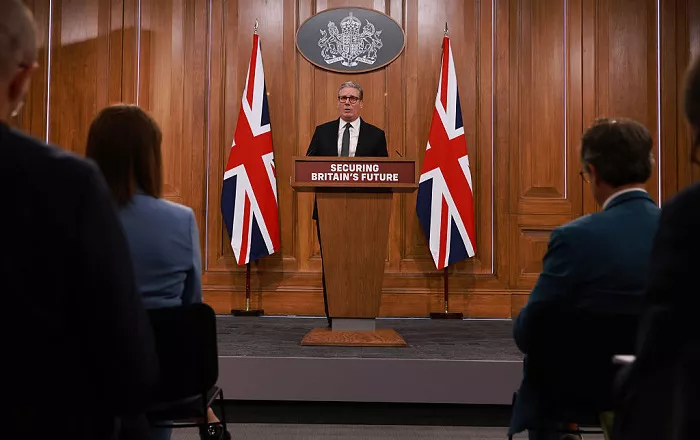Two decades ago, Britain made a bold decision to take a liberal approach to immigration. In a pivotal moment, a senior Foreign Office representative told Tony Blair that Britain, alongside Ireland and Sweden, would not impose transitional controls on migration from Eastern Europe as the European Union expanded. Blair’s response was simple: “Yes, we shouldn’t worry about numbers.” However, it was precisely those numbers that would come to haunt successive governments.
A Home Office-commissioned study initially projected that only 5,000 to 13,000 migrants would arrive annually. Yet by the end of the decade, 1.5 million Eastern Europeans had moved to the UK, marking the largest migration influx in the nation’s history. This wave of migration has had lasting political repercussions, with figures like Nigel Farage rising to prominence, and political parties across the spectrum grappling with how to respond.
Farage’s UK Independence Party (UKIP) secured a historic victory in the 2009 European elections, finishing ahead of Labour, and the pressure to respond to the growing immigration debate intensified. Successive prime ministers have tried—and failed—to contain this growing issue. Gordon Brown promised “British jobs for British workers,” David Cameron pledged to reduce net migration to “tens of thousands,” and Rishi Sunak’s government has vowed to “stop the boats.” Yet all have been left humiliated in the face of reality.
Starmer’s Shift on Immigration
Keir Starmer, the current Labour leader, is not known for his inflammatory rhetoric, preferring to focus on practical solutions rather than grand statements. Unlike Margaret Thatcher, who once declared, “economics is the method; the object is to change the soul,” Starmer’s speeches emphasize pragmatic governance. However, when it comes to immigration, Starmer has taken a sharper, more assertive stance.
In recent speeches, Starmer has condemned the previous Conservative government for what he calls a “one-nation experiment in open borders,” which he argues did “incalculable” damage to the UK. He has vowed to “shut down the lab” of unrestricted immigration policies, warning that without stronger controls, Britain risks becoming an “island of strangers.” Some critics, such as former Labour MP Zarah Sultana, have likened his rhetoric to that of Enoch Powell, particularly his infamous “Rivers of Blood” speech, which warned of the dangers of mass immigration. However, Starmer’s focus on diversity contrasts sharply with Powell’s call for racial exclusion. Starmer has consistently stated that migrants make “a massive contribution” to the country and that his warning is a social contract argument rather than a racially charged one.
From Blair’s Open Borders to Starmer’s Caution
The shift in Labour’s immigration stance marks a significant change from its previous position. In 2015, a backlash erupted when Ed Miliband’s Labour Party sold red mugs emblazoned with the phrase “controls on immigration.” A decade later, under Starmer’s leadership, the party has embraced stricter immigration measures with minimal internal dissent.
Starmer’s emphasis on immigration control aligns Labour more closely with the party’s pre-Blair roots. Labour’s early post-war leadership, such as Harold Wilson’s government in the 1960s, supported tighter controls on immigration, despite an overall commitment to social justice. Wilson’s 1965 immigration white paper reduced the number of “vouchers” available to Commonwealth citizens, prioritizing skilled workers. This sentiment is echoed in Starmer’s current approach, with Labour aides arguing that border control is essential for a social-democratic agenda.
The Boriswave and Its Impact
While the “Blair wave” of Eastern European migration is well understood, the “Boriswave,” a term popularized in late 2024, has begun to garner attention. Former Prime Minister Boris Johnson’s government, which ended European free movement, was initially described as the most anti-immigration in British history. However, Johnson’s government also significantly liberalized immigration rules, lowering the salary threshold for skilled migrant workers and removing the cap on the number of such workers allowed into the UK. This led to record levels of net migration, particularly from outside the EU, with net migration reaching 906,000 in the year to June 2023. Starmer now criticizes this “open borders” approach, framing it as a failed experiment.
Despite the rhetoric, Starmer’s policies represent a complex blend of continuity and change within Labour. His government plans include tighter immigration controls, including a ban on new social care worker visas and an increase in the immigration skills charge on employers. While Labour has made strides in expanding workers’ rights, such as raising the minimum wage and employers’ National Insurance contributions, it is clear that Starmer’s governme
Related topics:
- Anti-Immigration Protest in Poland Ahead of Presidential Elections
- Two Women Cross Italy by Motorcycle to Spotlight Immigration Issues
- Canada’s New Government Signals Tighter Immigration Controls


